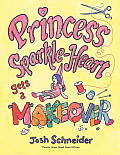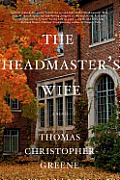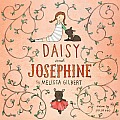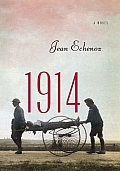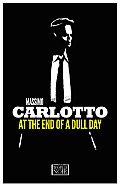Link to this review in the form of a comic strip by billba tagged historical fiction • coming of age
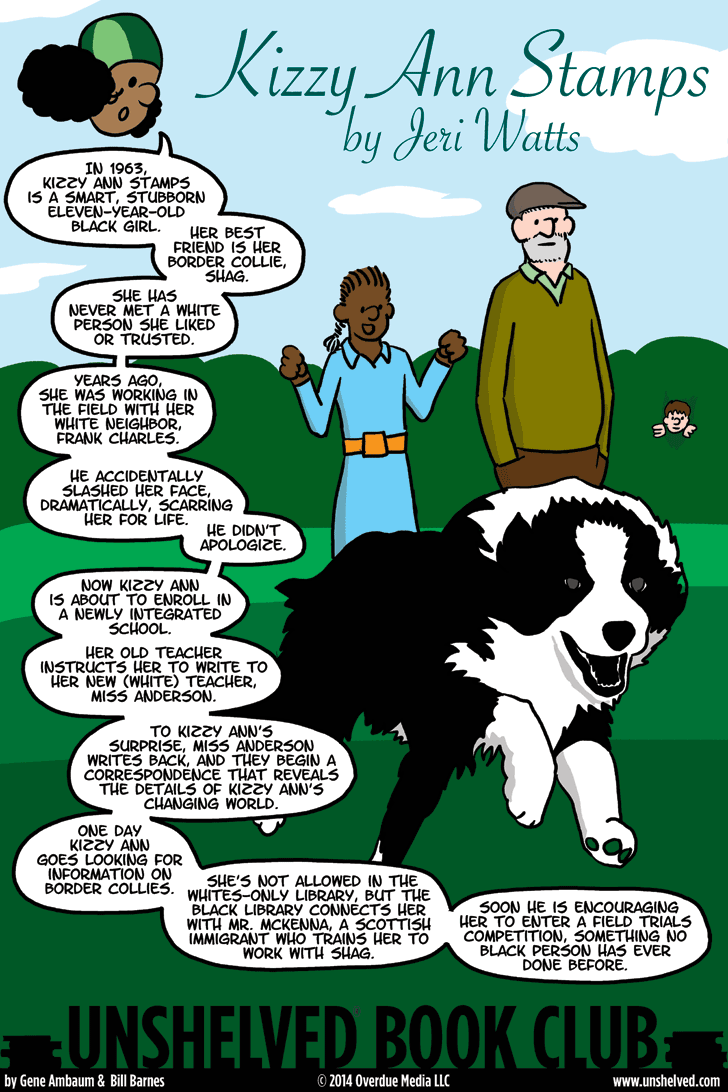
Click for the full-sized comic
@bookblurb Kizzy Ann has never met a white person she likes or trusted. Now she's enrolling in a newly integrated school.
Link to this review by dawn tagged picture book
When Amelia gets a beautiful new princess doll for her birthday, a whole new world of imagination opens for her. But her former best friend, her dog, is not happy with the situation, and exacts terrible vengeance when Princess Sparkle-Heart is left alone in the hall while Amelia takes a bath.
Why I picked it up: The cover of the book features a very self-satisfied doll. Her name is written in huge, glittery letters. Why would such a glamorous thing need a makeover?
Why I finished it: Schneider’s sense of layout and comic timing is marvelous. The first time I read it, I missed the inside flap explaining why the dog was so angry, but the long GRRRRRRRRRRRRRRRRRRRRRRRRRRRRRRRRRRRRRRRRRRRRRRRRRRRRRRRRRRRRRRRRRRRRRRRRRRRRRRRRRRs across the background in the first half of the book made it clear that this was one pissed-off Cocker Spaniel. This made the buildup to the crime suspenseful. The description of the massacre as an “accident” could be a hilarious introduction to understatement for kids.
Then Schneider switched to subtle foreshadowing to lead up to a surprise ending that made me laugh out loud. I should have seen it coming when Amelia asked for extra stuffing while glaring at her dog. ”Put in some extra…She needs more muscles. For protection.” I’ve read it six times now, and love it more and more each time.
It’s perfect for: My friend Carrie, who really appreciates that a little girl can love to play with a pretty dolly, but if she wants a monster (Carrie’s daughter Maris loves The Hulk), you should never stand in their way. Plus, Carrie is crafty enough to make Maris her own Princess Sparkle-Hulk using the pattern provided by the publisher!
@bookblurb Amelia gets a new princess doll for her birthday, but her dog isn’t happy with the situation.
Link to this review by geneambaum tagged literary • graphic novel
“Hawaii 1997” A boy on vacation sneaks out of bed and walks down to the beach where he has an unforgettable encounter with a girl.
“Anime” Janet doesn’t fit in, and her parents worry she doesn’t have a plan for herself. Obsessed with manga and anime, she takes a trip to Japan with her boyfriend.
Why I picked it up: I’ve read several of Alden’s mini comics, including one of the weirdest (and most beautifully drawn) fables I remember reading recently, Wicked Chicken Queen. (Alden’s Haunter is still viewable for free on Study Group Comics.)
Why I finished it: The art. Both stories are drawn in pencil, and Alden really creates a sense of mood and place with the soft lines. His Hawaiian nights at the beach are particularly beautiful, both for the reflective, restless water and the shimmering, starry skies. When the boy steps into the ocean and puts his head under the water, the image is spectacular.
Readalikes: Scott Morse’s The Barefoot Serpent, a sad graphic novel in which a girl on a beach in Hawaii recalls her older brother’s death. KC Green’s The Anime Club, about the rise and fall of a high school anime club that I’m sure Janet would have loved.
@bookblurb Two stories: a boy on vacation encounters a girl at the beach, and a girl obsessed with anime travels to Japan.
Link to this review by darcy tagged mystery
A man found wandering naked in Central Park turns out to be the Arthur Winthrop, the headmaster of an esteemed Vermont boarding school. He confesses to murdering Betsy, a young girl at the school, after a long love affair.
Why I picked it up: My co-worker Shelby recommended this book to me. From her description I got the idea it would be much like Lolita with a little murder thrown in.
Why I finished it: I was wrong. But as Arthur confessed, I got hooked. He described in great detail the way he wooed Betsy on campus, watched her as she studied, and eventually took her to a hotel in the city for sex. I loved the way the writer told Arthur’s story in several time periods of his life, from his early college years, to the recent past when his son died in combat, and back in the present when he’s in a jail cell. Arthur’s marriage began to unravel after the death of his son — it lacked intimacy and even a sense of companionship, and by the end of the novel, I sympathized with Arthur even as he confessed to dumping Betsy’s body in the river.
It’s perfect for: Lila, one of my patrons who loves mysteries without excess gore. Lila will really like the dynamic in the relationship between Betsy and Arthur. While Arthur felt he couldn’t live without Betsy, she was more nonchalant and felt that an affair with an older man was simply something to cross off her list. When Betsy drops him to pursue a relationship with another student, Arthur does what he can to get the student expelled.
@bookblurb Arthur Winthrop, headmaster of an esteemed boarding school, confesses to murdering a student after their affair.
Link to this review by dawn tagged picture book
Daisy loves her father and their jet set lifestyle, but often feels lonely. Her father, sensing her isolation, gives her the perfect present: a French Bulldog pup to be her companion.
Why I picked it up: I have a snaggle-toothed Frenchie who looks much like Josephine. Both of them are a dark brown with a white star on their chest. Truthfully, my Liza Lou isn’t half as graceful in her tutu as Josephine, and often will scrape it off on the bottoms of a chair despite how adorable she looks in it.
Why I finished it: Both the author and illustrator have clearly spent time with French Bulldogs. Josephine’s stubbornness is true to the breed, and when she abstains from fetching a stick to get comfy in a lawn chair instead, illustrator Kuo gets the details perfect, from the tilt of the pup’s head as the stick flies by to the way she primly tucks her paws when settling down for a rest. And I love the gentle colors, which contrast nicely to Josephine’s fine, dark coat.
It’s perfect for: My neighbor toddler friend Lucia, who keeps trying to steal Liza Lou from me. She will be as delighted when Josephine starts talking, declares she will teach Daisy some French, and insists on getting the tomboyish Daisy to play dress-up.
@bookblurb Daisy feels lonely, so her father gives her a French Bulldog puppy.
Link to this review by flemtastic tagged nonfiction
John Morton spent the beginning of his business career as a management trainee. He was put in many odd situations, like when he was responsible for an ice-cream eating contest for children and all the excited little children’s plastic forks were breaking on the hard ice cream. (He’d left it in the freezer too long.) He suffered through that and other embarrassing incidents with panache and humor. The title of this book comes from a lesson Morton learned during his managerial stint at a college pub. The pub was losing money, so he had to send a message to everyone that they needed to work harder. After he fired a very pretty waitress who couldn’t do her job, the rest of the waitstaff knew he meant business — if the hot girl’s job wasn’t safe, they knew no one’s was.
Eventually, Morton got a “big boy” job at American Airlines, where he worked his way up to writing speeches for executives. His life experiences make for an entertaining, inside look at one man’s struggles in the business field.
Why I picked it up: If I’m honest, because the promotional advertising mentioned that he’d had to blackmail a stripper.
Why I finished it: Funny things happened to Morton while he was training as a manager for a hotel chain. To prepare for a top position, he had to spend months working at every job below on the org chart. As a prep cook in the kitchen, he had to wear a kitchen hat with his name on it. The company balked at spending money to keep making embroidered hats for such a high-turnover job, so he wore someone else’s hat, someone named DeWayne. This required a little explanation when he was flirting with the waitresses. He eventually got some street cred with the kitchen crew, who were leery of a management trainee, when he arrived late for work after being arrested.
It’s perfect for: Tom, my neighborhood friend who just wrapped up five years of college and will be venturing into the business world. He would like that Morton is honest in revealing both his failures and successes, and that he wrapped up the last line of his book with a quote from Shel Silverstein, author of the greatest poetry book ever written Where the Sidewalk Ends.
@bookblurb An entertaining look at one man’s struggles to make it in management and business.
Link to this review by wally tagged anthology • short stories • literary
The fifth annual collection of short stories from around Europe brings together twenty-eight authors from all over the continent, including Iceland, Montenegro, and Slovenia.
Why I picked it up: I read short stories as an introduction to an author’s work, and according to the notes, many of these authors are famous in their home countries.
Why I finished it: I found a lot to love here, including a haunting story from Bosnia and Herzegovina, “The Curious Case of Benjamin Zec” by Elvis Hadzic, in which a boy makes a wish on a ladybug then finds himself grown up and playing Hamlet before an adoring audience. The Polish entry, “Homo Polonicus” by Krystian Piwowarski, read like a fable, with a disaffected prince bemoaning the peasantry’s idleness and a Jewish merchant’s business acumen while his own teeth fall out. In the Latvian story, “Dirty Laundry” by Inga Zholude, a single woman seems to have someone else living in her apartment, although she can never see or communicate with him. In the Slovenian story, “The Pool” by Vesna Lemaic, a man’s father gets a new swimming pool which has a strange, powerful pull on everyone in his neighborhood, including the narrator, who can do nothing to save the lives of people who just want to spend their time in the water before it sucks them under.
It’s perfect for: Elizabeth, who might recognize more of these authors than I did. I think she’d particularly enjoy the more humorous French story, “Hippopotamus” by Eric Chevillard, in which a man tells people that he has won a grant to go to Africa and write about the experience. In reality he has done no such thing, but he must follow up his lie with an actual trip. This terrifies him; he faints when he realizes how many vaccinations he must get, and then gets taken off the plane after he’s seated next to an African who is so terrified of flying he attacks the Frenchman.
@bookblurb Short stories from twenty-eight European authors.
Link to this review by robert tagged historical fiction • literary
This slender novel’s dispassionate, third-person narrative describes the fates of five Frenchmen (magnate, accountant, butcher, knacker, and tailor) called up to serve in World War I, and the woman (and shoe factory) they left behind. Echenoz’s vivid descriptions range from the petty to the terrifying, from squabbles over army-issued clothing (handy tip: if you show up late to the mustering point, they might be out of your size) to grisly descriptions of the the violence of an artillery bombardment. Plots to avoid fate, or simply take a walk in the woods, go awry with the same, oft-fatal results as doing nothing.
Anyone who has carried a heavy burden in a backpack will appreciate the three pages where Echenoz describes how something that starts at less than two pounds in weight becomes a load exceeding seventy pounds. Equally eye-opening is an exposition on how the relationships between people and animals change in a war zone. Fourteen carefully written endnotes by the translator supply information where a word or phrase may cause confusion.
Why I picked it up: People writing about World War I tend to write big books. A recent edition of August 1914 by Aleksandr Solzhenitzyn is 896 pages long. This was under 130 pages, and I was in the mood for something brief.
Why I finished it: On a per-page basis, this was the most demanding fiction I’ve read recently. The cold, emotionless voice forced me to infer the characters’ emotions and motivations, and I appreciated the chance to stretch my imagination in unexpected ways.
Readalikes: Paths of Glory by Humphrey Cobb is referenced in one of the endnotes, and is among other things a cautionary tale about the pitfalls of perfunctory and suborned justice, a theme that’s addressed in 1914. All Quiet on the Western Front by Erich Maria Remarque is the blockbuster novel of World War I, and, like 1914, it has a segment dealing with lice. The Beauty and the Sorrow: An Intimate History of the First World War by Peter Englund gives a non-fiction view of World War I from twenty different perspectives, including an adolescent schoolgirl and a Venezuelan-born cavalry officer in the Turkish Army, all of whom are buffeted about the globe by the same sort of impersonal bureaucracies and hierarchies that govern the lives of the characters in 1914.
@bookblurb The fates of five Frenchman called up to serve in WWI, and the woman they left behind.
Link to this review by geneambaum tagged mystery
After having his criminal record expunged, Giorgio Pellegrini is a successful, happily married restaurateur with friends in high places. He and a friend run a discreet, expensive service providing call girls to local power brokers, but he has left behind his life of violence. When he’s robbed, betrayed, and his restaurant is taken over by the mafia, however, he must return to his former way of doing things.
Why I picked it up: The black and white cover, with just a touch of yellow, caught my eye when I was looking at a display of crime novels from around the world at Third Place Books.
Why I finished it: Pellegrini lives up to the quote on the back of the book from The New York Times: “Cold and heartless — but, in a creepy way, fascinating.” He’s a manipulative, controlling bastard, especially to the women in his life, which includes his wife, her best friend, his business partner, and the girls who work for them. Yet when he refused to fold or run away as his life fell apart, I found myself rooting for him.
Readalikes: Manchette’s Fatale, which has an equally cold protagonist, a young woman who travels from town to town deciding who she wants to kill and how to get paid to do it. The mafia underestimates the lengths Pellegrini will go to get out from under their thumb, which reminded me of Polar, a story in which a shadowy organization miscalculates how merciless one of their former agents is.
@bookblurb A restaurateur with a criminal past must return to his former, violent way of doing things when he’s betrayed.

